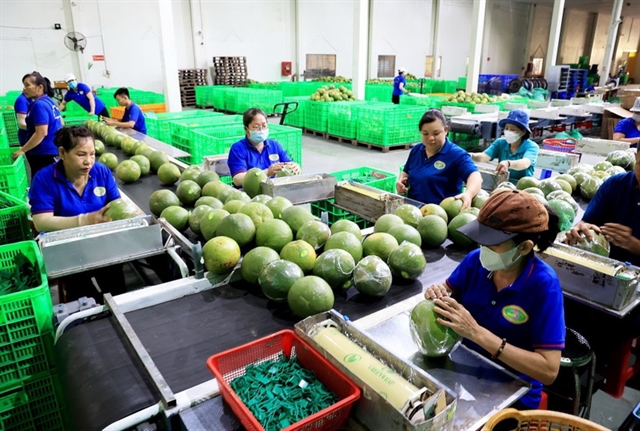 Economy
Economy


|
| Workers at a fruit packaging factory in Vĩnh Long Province. VNA/VNS Photo |
HÀ NỘI — Product identification and traceability remain the two pillars of modern market management, according to Trần Hữu Linh, Director General of the Department of Domestic Market Management and Development under the Ministry of Industry and Trade, speaking at a conference yesterday on enhancing the value of Vietnamese products.
Linh explained that identification enables precise recognition of products from production to consumption, while traceability provides complete and verifiable information about the product’s journey. Combined, these elements create a transparent management ecosystem where every transaction can be verified and authenticated.
He stressed that a unified national traceability system is essential — one that employs modern, accessible technologies, can be integrated with management systems across other ministries and sectors, and complies with international practices.
Economists noted that applying traceability systems not only helps businesses strengthen their brands but also serves as a passport for Vietnamese goods to overcome technical barriers and access demanding markets.
In recent years, the Ministry of Industry and Trade has been developing a legal framework for product identification and traceability, including drafting a decree on criteria for determining the origin of domestically circulated goods. Once issued, the decree will provide a crucial legal basis for distinguishing genuine and counterfeit products, Vietnamese and imported goods, while supporting anti-fraud measures and protecting consumers.
Meanwhile, the Department of Domestic Market Management and Development is working with other agencies to implement advanced technologies such as blockchain, Internet of Things (IoT), QR codes and GS1 barcodes to ensure full-process, accurate traceability. Vietnam currently has 19 free trade agreements, 17 of which have taken effect or are being implemented.
Head of the Goods Origin Division under the Agency of Foreign Trade Trần Thanh Bình said the network of major FTAs offers Vietnamese goods enormous opportunities to penetrate international markets. Preferential tariffs under FTAs provide a significant competitive advantage abroad, but to fully benefit from these agreements, enterprises must meet all regulatory requirements, with traceability being a key condition.
She explained that goods management in Việt Nam is divided into two categories: domestic circulation and import–export. For goods circulated within the country, the focus is on identification and traceability, while for exports, determining origin is mandatory. Though these areas differ, they are closely coordinated to protect consumers and meet international obligations.
In practice, tariff differentials based on origin certification create a substantial competitive edge. For example, Vietnamese rice exported to the EU without a certificate of origin faces a tariff per tonne, whereas with a valid certificate the rate drops to zero, helping Vietnamese enterprises enhance their competitiveness in global markets. — VNS




